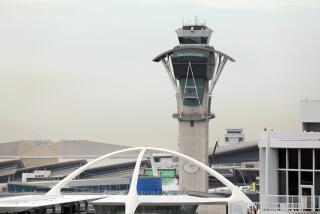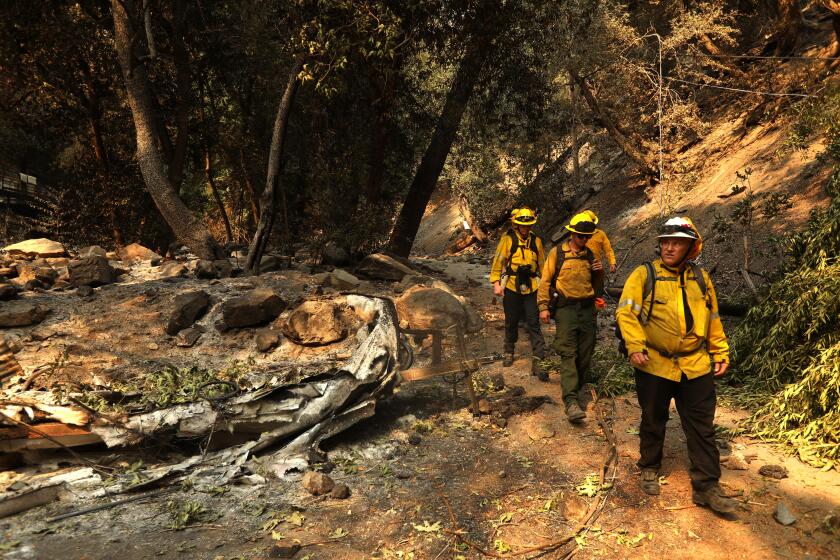A wake-up call for those travel nightmares

Things go wrong. On the road, in the air, at the hotel — they go wrong everywhere. But if you have an idea about how to remedy them, these snafus might not worry you as much. Here’s a quick look at several unhappy travel scenarios, how aggravating they are on a 10-point scale (10 most, 1 least) and how to overcome them
The problem: You overslept and missed your plane — and you have a nonrefundable ticket.
Aggravation factor: 3 if you’re headed to Las Vegas or the Bay Area on Southwest Airlines; 5-plus if you’re headed to most other U.S. cities, 6-plus if you’re leaving the country.
The cause: Illness? Hangover? Doesn’t matter.
The effect: You wait another hour (if you’re going to Las Vegas or another city with frequent service), many hours or even overnight.
The remedy: Call the airline (or head for the check-in counter) and book your next departure.
The cost: It depends. With nonrefundable tickets from most carriers, you start with the ticket-change fee — $150 at American, United and others. You’ll also need to pay the difference between the cost of your unused ticket and the new one. There could be no difference or it could be $300 more. With Southwest Airlines’ nonrefundable fares, you apply the cost of your original ticket to the cost of a new ticket on the next flight, and there’s no change fee.
The trick next time: Watch the clock and give yourself more time to get to and through the airport. Airlines recommend you arrive 90 minutes in advance for domestic flights.
The problem: Your name is misspelled on your airline reservation.
Aggravation factor: From 1 to 5, depending on when you discover it and where you’re flying.
The cause: A typo, or bad spellers
The effect: This could keep you off a flight, especially if an agent sees that the name on your ticket doesn’t match your government-issued identification. But in practice, typos happen often without serious repercussions. Transportation Security Administration spokesman Nico Melendez says TSA agents are trained to sort out one- and two-letter discrepancies from more serious issues. So are gate agents. “If there’s a misspelling in the name, it’s not something to be overly concerned about,” Melendez says. In fact, he adds, agents often use commercially available databases to confirm identities for travelers whose wallets or purses have been lost or stolen or for those who have been married recently. That, he says, “might take a few extra minutes at the security checkpoint.” With foreign flights, a perfect match is more important. The officials involved are typically customs and border protection agents, not TSA.
The remedy: Call your airline ASAP. Even if TSA is willing to wave you through, who knows what another country’s customs agents will make of the discrepancy? That misspelling could also mess up your mileage-program points.
The cost: Maybe none, maybe a few minutes of your time. But airline practices vary. Sometimes a name correction is free. Sometimes agents will leave the spelling uncorrected, but put a note in your file to prevent confusion at the gate. In some cases, you could face a $150 ticket-change fee.
The trick next time: When you make your booking, proofread carefully. If you get married and change your name and there’s not enough time to get the names on your identification and air tickets to match up, take a copy of your marriage license with you to the airport.
The problem: Your rental car company is dinging you for damage you never saw.
Aggravation factor: From 4 to 6, depending on the amount.
The cause: Pothole? Keying? Maybe you just didn’t notice the damage or it happened after you returned the car.
The effect: Rental company supervisor informs you of the damage, followed by a bill in the mail.
The remedy: You pay directly, or if your own automobile insurance covers this (as some do), it will help cover the cost beyond your deductible.
The cost: As I learned last year on Maui, $500 worth of damage to the bottom of a bumper can be nearly invisible.
The trick next time: Use your cellphone to take photos of your rental car when you pick it up. That way, you’ll know the condition of the car when you started out. If you’re really concerned about this, you can buy the extra insurance rental-car agents are forever pushing.
The problem: On a cruise ship port call, you return to the dock too late.
Aggravation factor: From 4 to 8. As Cruise Week publisher Mike Driscoll says, it all depends on the geography.
The cause: You misunderstood the deadline or lost track of time.
The effect: The ship has sailed. Cruise insiders call this “fail to join.” (It’s rare, but many passengers worry about it.)
The remedy: Find the cruise line’s port agent, who will help you book a flight to the ship’s next stop. You also might need a hotel for a night.
The cost: Maybe less than $500 for a couple, if you’re hopping among accessible Caribbean or Hawaiian islands. But if your next port call is days away (in the South Pacific, for example), costs could jump substantially.
The trick next time: Heed the schedule and watch the clock.
The problem: You pay upfront to get a hotel-room discount, then weather delays your arrival by a day.
Aggravation factor: 7.
The cause: To save 10% to 15% (a discount many hotels now offer in exchange for advance payment), you took a chance and got unlucky.
The effect: The hotel has your money and you’re stuck for the night in another city.
The remedy: Call the hotel and beg. Some, like the boutique Library Hotel in New York, say it has adjusted many prepaid reservations at no charge this winter. Just remember to get paperwork from the airline affirming that your first flight was canceled.
The cost: One night’s lodging, maybe
The trick next time: Don’t pay upfront for your first night when flying to cities with harsh winters.
The problem: Your hotel is on fire.
Aggravation factor: Off the chart.
The cause: Not important.
The effect: Evacuation orders as firefighters wrangle ladders and hoses.
The remedy: On arrival, read those charts showing non-elevator exit routes. If fire breaks out, follow orders. The U.S. Fire Administration (part of the Department of Homeland Security) recommends that if the fire is in your room, leave quickly, close the door, sound the alarm and notify the front desk. Always use a stairwell, never an elevator, officials say. If there’s a fire elsewhere and you’re unsure if it’s safe to leave your room, officials say, touch the door with the back of your hand. If it’s cool, get low to the floor, brace your shoulder against the door and open it slowly. Be ready to close it quickly if there are flames. Crawl low (where the freshest air is) to the nearest exit. If your room door is hot, officials say, don’t open it. Instead, seal the door with wet towels or sheets, turn off fans and the air conditioner, call the fire department to give your location and try to signal from your window.
The cost: Not a factor
The trick next time: Hotel fires rarely happen. But if they concern you, travel with a flashlight (to aid your escape) and stay in a hotel with smoke detectors and sprinklers that are approved by the U.S. Fire Administration. For a list of lodgings that comply with the Hotel and Motel Fire Safety Act of 1990, go to https://www.usfa.dhs.gov/citizens/hotel.shtm. Or stick to lower floors. In his “Travel Detective Bible,” consumer advocate Peter Greenberg notes, “There’s not a fire department in the country that can easily fight a fire above the eighth floor.”
More to Read
Sign up for The Wild
We’ll help you find the best places to hike, bike and run, as well as the perfect silent spots for meditation and yoga.
You may occasionally receive promotional content from the Los Angeles Times.







